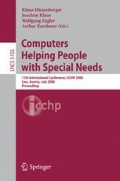Abstract
Mobility is one prerequisite for carrying out an autonomous and independent life. As mobility impaired pedestrians impose very heterogeneous requirements regarding the calculation of optimized routes and the provision of navigation instructions, currently available navigation systems do not offer sufficient support. The main drawback is due to inadequate map data which is mostly optimized for car navigation. To overcome these limitations, the technique of multimodal annotation of geographical data has been developed for which additional requirements have been gathered by conducting a survey including 88 visually impaired respondents. Within this paper, the results of the survey are presented. Requirements for multimodal annotation are derived and discussed.
Access this chapter
Tax calculation will be finalised at checkout
Purchases are for personal use only
Preview
Unable to display preview. Download preview PDF.
References
Clark-Carter, D.D., Heyes, A.D., Howarth, C.I.: The efficiency and walking speed of visually impaired people. Ergonomics 29, 779–789 (1986)
Corona, B., Winter, S.: Datasets for Pedestrian Navigation Services. In: Angewandte Geographische Informationsverarbeitung: Proc. of the AGIT Symposium, ASR Seibersdorf Research GmbH, Austria, pp. 84–89 (2001)
Ding, D., Parmanto, B., Karimi, H.A., Roongpiboonsopit, D., Pramana, G., Conahan, T.: Design Considerations for a Personalized Wheelchair Navigation System. In: EMBS 2007: Proc. of the Annual International Conference of the IEEE on Engineering in Medicine and Biology Society, pp. 4790–4793. IEEE Press, New York (2007)
Humanware Trekker Product Information, http://www.humanware.com/en-europe/products/gps/trekker
Loomis, J.M., Golledge, R.G., Klatzky, R.L., Speigle, J.M., Tietz, J.: Personal guidance system for the visually impaired. In: Assets 1994: Proceedings of the first annual ACM conference on Assistive technologies, pp. 85–91. ACM Press, New York (1994)
Meyers, A.R., Anderson, J.J., Miller, D.R., Shipp, K., Hoenig, H.: Barriers, facilitators, and access for wheelchair users: substantive and methodological lessons from a pilot study of environmental effects. Social Science & Medicine 55, 1435–1446 (2002)
Pressl, B., Wieser, M.: A Computer-Based Navigation System Tailored to the Needs of Blind People. In: Miesenberger, K., Klaus, J., Zagler, W., Karshmer, A.I. (eds.) ICCHP 2006. LNCS, vol. 4061, pp. 1280–1286. Springer, Heidelberg (2006)
Pressl, B., Mayerhofer, B., Wieser, M.: PONTES und ODILIA - Zwei Systeme im Dienste der Blindennavigation. In: Tagungsband Internationale Geodätische Woche Obergurgl, pp. 75–82. Wichmann Verlag (2007)
Ran, L., Helal, S., Moore, S.: Drishti: An Integrated Indoor/Outdoor Blind Navigation System and Service. In: Proc. of the Second IEEE International Conference on Pervasive Computing and Communications (PerCom 2004), pp. 23–30. IEEE Press, New York (2004)
Sendero Sendero GPS Product Information, http://www.senderogroup.com/shopgps.htm
Strothotte, T., Fritz, S., Michel, R., Raab, A., Petrie, H., Johnson, V., Reichert, L., Schalt, A.: Development of dialogue systems for a mobility aid for blind people: initial design and usability testing. In: Assets 1996: Proceedings of the second annual ACM conference on assistive technologies, pp. 139–144. ACM Press, New York (1996)
University of Illinois Medical Center, http://uimc.discoveryhospital.com/main.php?id=3246
Völkel, T.: Personalized and adaptive navigation based on multimodal annotation. SIGACCESS Access. Comput. 86, 4–7 (2006)
Völkel, T., Weber, G.: A New Approach for Pedestrian Navigation for Mobility Impaired Users Based on Multimodal Annotation of Geographical Data. In: Stephanidis, C. (ed.) UAHCI 2007 (Part II). LNCS, vol. 4555, pp. 575–584. Springer, Heidelberg (2007)
Vujakovic, P., Matthews, M.H.: Contorted, Folded, Torn: Environmental Values, Cartographic Representation and the Politics of Disability. Journal of Disability & Society 9, 359–374 (1994)
Author information
Authors and Affiliations
Editor information
Rights and permissions
Copyright information
© 2008 Springer-Verlag Berlin Heidelberg
About this paper
Cite this paper
Völkel, T., Kühn, R., Weber, G. (2008). Mobility Impaired Pedestrians Are Not Cars: Requirements for the Annotation of Geographical Data. In: Miesenberger, K., Klaus, J., Zagler, W., Karshmer, A. (eds) Computers Helping People with Special Needs. ICCHP 2008. Lecture Notes in Computer Science, vol 5105. Springer, Berlin, Heidelberg. https://doi.org/10.1007/978-3-540-70540-6_163
Download citation
DOI: https://doi.org/10.1007/978-3-540-70540-6_163
Publisher Name: Springer, Berlin, Heidelberg
Print ISBN: 978-3-540-70539-0
Online ISBN: 978-3-540-70540-6
eBook Packages: Computer ScienceComputer Science (R0)

